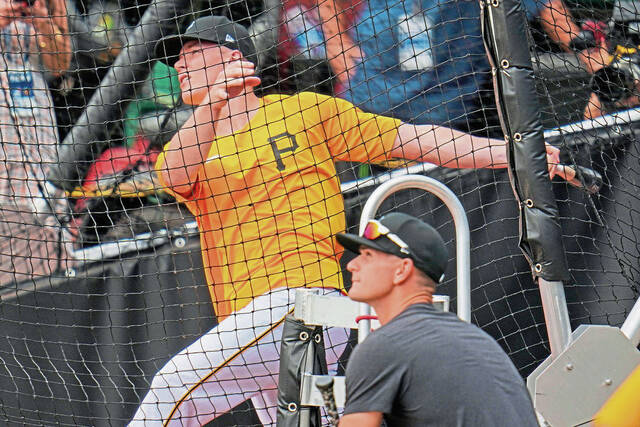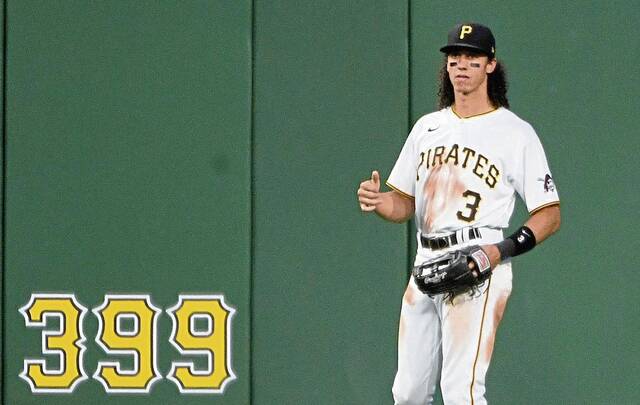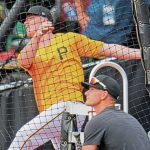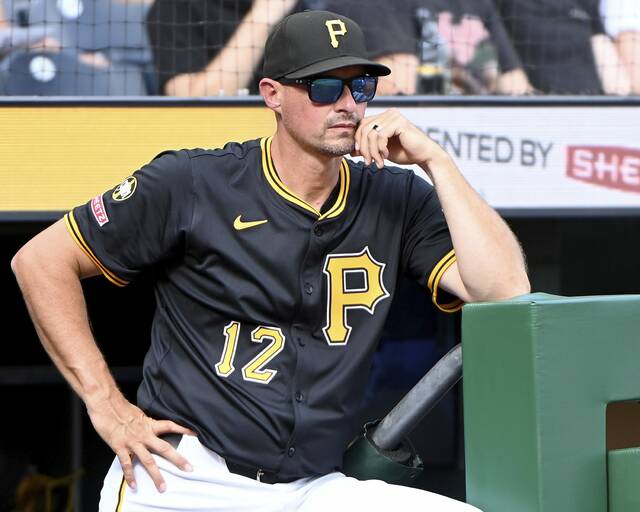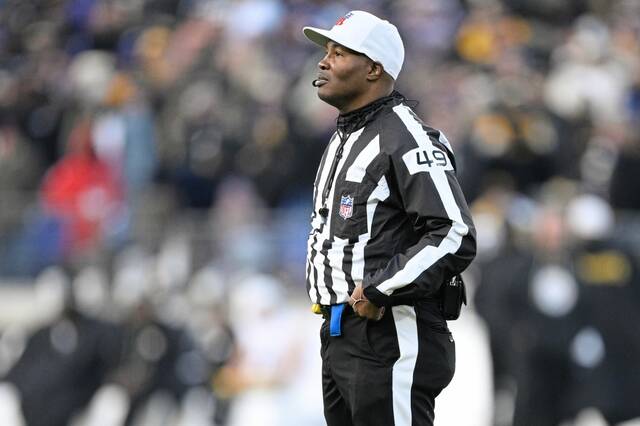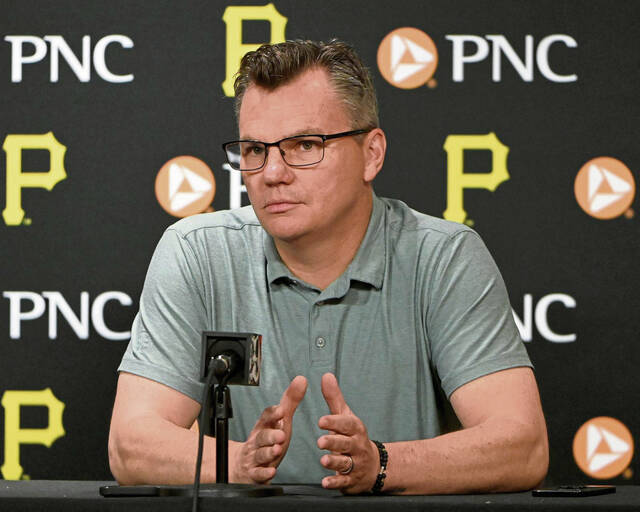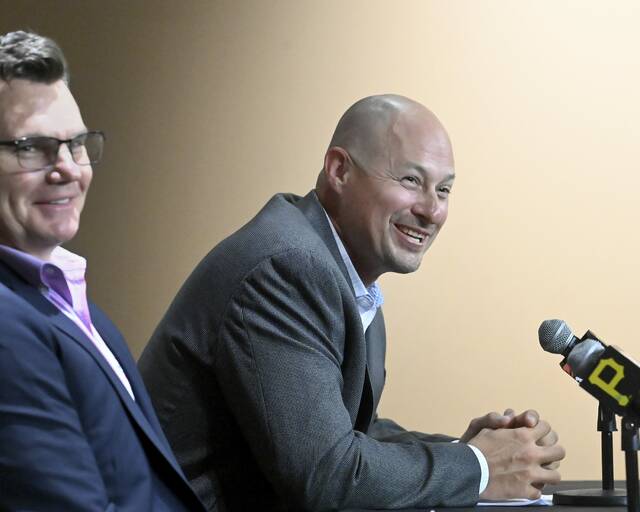John Baker was dressed in casual attire, wearing a green blazer over a Roberto Clemente T-shirt and tapered khakis, as he sat on the home dugout bench at PNC Park. He looked and sounded more like a professor giving a lecture than the Pittsburgh Pirates farm director talking baseball.
When the Pirates hired Baker last fall, they did so with plans to reimagine — and, perhaps, reinvent — the way to develop young talent through the minor league system.
After playing 359 games in seven major league seasons as a backup catcher for three teams, Baker became a mental skills coach in the Chicago Cubs organization. So he has the intention of using both his old-school playing experience and new-age philosophical approach to change the way prospects are coached.
In a wide-ranging 20-minute conversation, the last question asked of Baker was about how the implementation of his mental skills plan with the Pirates is coming along.
Baker brought up what he called the three points of self-determination: “You have autonomy, competence and connectedness, or connection. I have to feel like I’m connected to the people around me. I have to believe I have the skills necessary to get the job done. And I have to believe that I have the autonomy to make decisions about my own career, my own process.”
Baker is building into the framework of the organization the focus of that lens in what he calls an “easy” acronym: What’s Important Now.
“What is mental toughness? Paying attention to the right thing at the right time, regardless of circumstances,” Baker said, who not only teaches mindfulness but says he speaks it into the club’s cultural process. “If you set up an environment where people have a say, they believe that their training works and they’re connected to their friends, that’s the source. That’s the theory that I believe is the source of our intrinsic motivation to go out and play really hard.”
Then Baker brought up something interesting, how it’s one thing to indoctrinate that philosophy from the bottom up but another to try to instill it from the top down. His approach is the opposite of what Pirates general manager Ben Cherington and manager Derek Shelton are trying to do, even though their roles are all connected.
“The big difference happens from the minor leagues that you’re going to experience as a player is that you go from asking questions to then you get here, everybody asks you questions,” Baker said. “So what we’re trying to instill in our younger players is that continuous curiosity, to keep asking and to not let success get in the way of improvement ever.”
The Pirates are trying to build a team by challenging players to become competent, connected and continue to show curiosity. It’s what Baker believes is the recipe for winning baseball.
So, what’s important now?
1. The top prospect: Just when the Pirates were planning to give their No. 1 prospect, Oneil Cruz, an extended look in the outfield, he experienced tightness in his right (throwing) forearm.
The interruption of his season also threw a wrench into the Pirates’ plans for Cruz to play in the outfield at Double-A Altoona.
“I don’t think it makes a lot of sense with a couple of weeks left in the season,” Baker said. “Also — and this is the message we communicated to Oneil — he’s proven to us he can play shortstop in the major leagues. He makes plays that nobody else makes. He makes his fair share of mistakes, like every young player, but he’s shown us that he can play shortstop.”
The 6-foot-8 Cruz has made it clear that he prefers playing shortstop, even if he’s an anomaly at the position. Yet, after parting ways with Gregory Polanco, the Pirates are looking for a right fielder and Cruz has the requisite speed, power and arm strength to project as a productive corner outfielder.
What Baker sees in Cruz is what the Pirates have been preaching for the past two seasons under Shelton: Their value of versatility. Shelton spoke last week about the benefits of coaching Ben Zobrist in Tampa Bay and Marwin Gonzalez in Minnesota.
“When you have that functionality like Zo and Marwin did,” Shelton said, “and be able to play short, that’s what separates everything.”
Zobrist has played every position but pitcher and catcher. A natural middle infielder, he has played the equivalent of a major league season in both right field and left. Same for Gonzalez, who has played at least 144 games at every infield position and 174 in left.
Baker brought up another versatile star, one he spent six years working alongside with the Chicago Cubs.
“When I think about Oneil, I think about Kris Bryant,” Baker said of the 2015 NL rookie of the year and ‘16 NL MVP. “Cruz hits the ball harder, throws the ball harder and runs faster than Kris Bryant does — and he plays shortstop. Kris Bryant is a tremendous player at basically five positions: first, third and all three outfield spots.
“When I look at Oneil Cruz move around, I look at his capability and his capacity to learn new things and I think, ‘Well, why not that, too? What kind of asset will you have in the future if you can have a plus center fielder and a plus shortstop in one person?’ That builds in the ability to constantly adjust to the injury demands that we see in professional baseball nowadays.”
First, Cruz has to show that he’s the next Kris Bryant and not the next Gregory Polanco. While Baker raved about his talent, it’s what he said about the likelihood that Cruz is expected to play winter ball in his native Dominican Republic (and not the Arizona Fall League) that is cause for concern. Baker called it “what he needs to be constantly challenged and to keep him interested.”
2. The former first-rounder: To stress his point that multi-positional players add value and make it easier to construct a major league roster, Baker brought up the Pirates’ top pick in 2014.
“Then you don’t have the thing that they ran into with Cole Tucker here where Cole comes up to the big leagues and goes out to the outfield for the first time. That’s got to be scary as hell,” Baker said of the shortstop. “I can’t imagine that kind of stress. What does that add to the allostatic load? I don’t know. A lot, (if you’re) getting yelled at out there if you miss a fly ball. So we want to do it early. We want to normalize it so that’s just what’s expected.”
The Pirates are seeing firsthand the difficulty of doing it at the major league level, from Hoy Park and Yoshi Tsutsugo playing the outfield to Tucker and Kevin Newman taking turns at second base. It’s taking them out of their comfort zone.
But Baker put a different spin on it.
“I think it’s just more fun to to go out there and learn a lot of new things,” Baker said, “and it can keep that monotony of a minor league baseball season or even a major league baseball season with some of these guys they can keep it under control a little bit for that some of them in on it.”
3. Reimagining Instructs: Say goodbye to the Instructional League, which Baker called “a term from the past,” as the Pirates are planning to introduce individualized camps instead.
Baker said the Pirates plan to have a “very small camp” for position players at Pirate City in Bradenton, Fla., from mid-October until mid-November.
They will hold a 45-man camp for pitchers for two weeks in December, as both a way to “check in with our guys in the middle of the offseason” and to get individualized instruction.
As Cherington noted last week, the Pirates are exploring the idea of having their pitchers throw year-round instead of shutting down in the offseason. So they are having another camp from Jan. 10 to Feb. 10 to get pitchers ready for spring training.
That’s where he went into the “weeds of physiology,” discussing the desire to explore the safest ways to adapt their throwing program. Once their season ends, pitchers will begin a weighted-ball recovery program. Baker doesn’t want them getting more than two weeks out of competitive shape.
“It just doesn’t make sense to professional athletes to go so far. It’s not the days of beer and cigarettes in the offseason and then use spring training to get in shape,” Baker said. “Part of that is why we’re trying to build our ramp-up to spring training and our heavy programming in January because we’d like to have our guys for the end of their offseason. That way, we can control for any injuries that pop up. If we have them there for that month leading up to spring training, we’re certain of the amount of batting practice they’re throwing and their throwing programs. It’s a bit manipulative, maybe, but we want to have our hands on the strings as we approach next season. We don’t know how everyone’s going to recover because we never had a year off before in baseball.”
Baker said the Pirates are taking a “conservative approach” with their pitchers, as their pitch and inning counts have gone up and down the past two seasons. So, the Pirates are advising their pitchers against playing winter ball in their native countries, for fear that controlled pitch counts can give way to competitiveness. Instead, they are inviting their Latin American minor league pitchers to stay at Pirate City to train in the offseason.
“I’m disappointing a lot of winter ball GMs when they call and ask about some of our minor league pitchers,” Baker said. “On the position player side, we’re working tirelessly to get anybody who wants to play winter ball a job. Go play, and play as much as possible.”
4. New No. 1 pick: The first professional season for the No. 1 overall pick of the 2021 MLB Draft ended prematurely, when catcher Henry Davis strained an oblique.
If Davis is ready to return this fall, Baker said the Pirates will try to “find the right place for him to go and play and get at-bats” — making him a potential candidate for the Arizona Fall League.
After signing for a $6.5 million bonus, Davis played two games in the Florida Complex League before being assigned to High-A Greensboro.
“From our observations of him, he’s absolutely ready for the level he was at, and perhaps (will be ready for) more pretty quickly,” Baker said. “That’s what you get from a 1-1 position player in the draft. He’s intense in all the right ways. He’ll look right through you. He goes out there to compete and win and it’s been really fun.”
Baker said the Greensboro Grasshoppers were the perfect place to start, given that their roster features top-10 prospects Nick Gonzales, Quinn Priester, Liover Peguero, Carmen Mlodzinski and Michael Burrows.
“They welcomed him as only a baseball team can, by just talking a bunch of trash to him all the time,” Baker said. “And he fit right into that group and that environment. So we want to find a place for him to play, perhaps something like the Arizona Fall League if it’s going to happen. If not, we will have to get creative.”
5. For Sho: When Baker was with the Cubs, starting pitcher Travis Wood would shag fly balls in the outfield “and be better than our center fielder,” and had a pair of three-home run seasons.
“He’s a rare one,” Baker said. “You don’t know many pitchers like that, guys like that who can walk around doing backflips and stuff like him. He’s a super athlete. But I think that there’s probably more of those out there than have had the opportunity for us to open.”
Baker confessed that he’s “not ashamed to admit” that he checks the box scores to see how Shohei Ohtani fares, calling the Los Angeles Angels two-way star “one of the faces of the game” and asking, “Is there anybody more fun in baseball to watch than Ohtani?”
Baker said Ohtani’s success this season has forced scouts to reconsider baseball’s absolutes and reinvestigate their own processes to see if there are more two-way stars out there.
The Pirates might have one in their system in Bubba Chandler, the right-handed pitcher who doubles at shortstop.
“We’ll see. I think he’s the one that’s gonna turn everybody’s hair gray. With every hit he gets, with every home run he hits our pitching coordinator sheds one one more tear,” Baker said, with a laugh. “Bubba, is a special, special, special talent. The reviews that we’ve gotten back from just how this kid can like control his body and move on the field, it’s exceptional. It stands out in an environment of standouts. So we will explore the multi-positional thing until the game tells him otherwise.”



